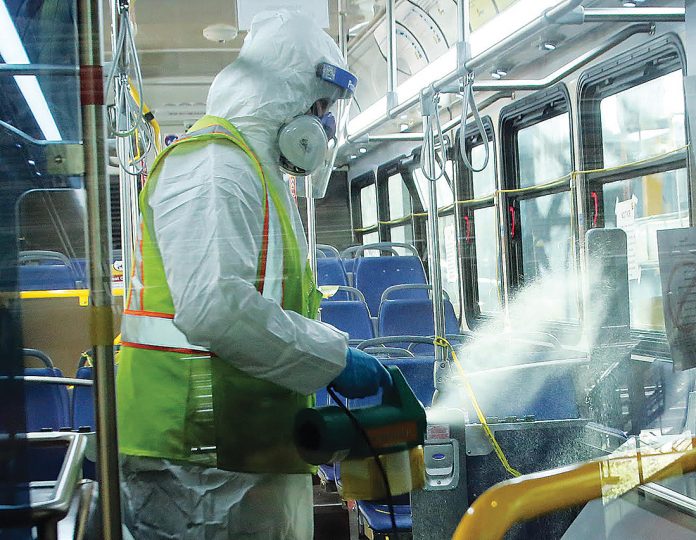
SANTA CRUZ COUNTY—Deep cleaning is now routine at Santa Cruz METRO to not only keep their fleet on the road, but to assure riders that busses are squeaky clean.
Every day since early March, before the first person in Santa Cruz County was diagnosed with Covid-19, busses in use get an interior disinfectant fogging and a hands-on disinfectant wipe-down, in addition to the normal cleaning and shower.
And it doesn’t stop there: New workers have been hired to clean each bus at a route’s end over the course of the day at the stations in Santa Cruz, Scotts Valley, Watsonville and the Capitola Mall. Equipped with cleaning tools and disinfectant, the crew sanitizes handrails, stanchions, hand straps, door handles and more.
“These workers that make sure our busses are safe for our drivers and customers, every day, are some of our unsung heroes,” said METRO CEO Alex Clifford. “We don’t always pay attention to these valued people who work behind the scenes.”
Indeed, as most folks wrap up their workday, that’s when the METRO vehicle service workers start their day. At 6 p.m., before each bus heads through a giant automatic wash station, the busses get a thorough, hand-detailed cleaning and a disinfectant fogging, by people such as Manuel Madrigal of Watsonville. He’s been at it for the past three years, making sure busses head out at the start of the day sparkling clean.
“It feels good,” he said. “Knowing that I am helping my community; it’s important work.”
Jerry Ayala of Watsonville is also on the crew.
“I work from 6 until 2:30 in the morning,” he said. “It’s a good job; I’m glad to be working and helping METRO.”
As county residents edge into week nine of the stay-at-home/social distancing order to combat the pandemic, Clifford said METRO has made numerous temporary emergency adjustments, including switching entirely to a weekend service schedule, ending routes across the county at 8 p.m., and scrubbing routes 68 and 3. The popular Highway 17 Express that runs between Santa Cruz, Scotts Valley and San Jose has also seen modifications.
“Our drivers really love our passengers,” said James Sandoval, General chairperson for SMART (International Association of Sheet Metal, Air, Rail and Transportation Workers) Local 23, who has been with METRO for over seven years. “Yes, there have been changes but our drivers keep showing up every day dedicated to the METRO. Everybody doing their part is a beautiful thing.”
He said that in New York alone, about 40 bus drivers have died from the Covid-19.
Sandoval stressed that METRO management “works really well with the local 23.”
“That’s what it takes to get through this,” he said.
All buses now run an electronic message on the front marquee: Essential Travel Only—in English and Spanish. They also have customers entering and exiting through the rear door to protect operators by reducing their potential exposure.
Riders are asked to wear face coverings, keep a safe distance from operators and keep their bags to themselves, not placing them on seats and aisles. Operators are further protected by a clear plastic curtain they deploy when boarding passengers.
METRO has also suspended fares until further notice and have rearranged seating, with yellow tape and signage, to accommodate 6-foot social distancing. With roughly 150 coach operators and 94 buses, Clifford said spacing people out on the bus usually means a maximum of five to eight people, depending on the size of the bus.
He urged the public to keep the limited space available for essential travel.
“We don’t do this maliciously—it’s a METRO system-wide temporary emergency standard as we attempt to provide an essential service and to comply with the County Health Agency’s Orders,” Clifford said. “We want to minimize conflict and we are encouraging people not to be angry about these new standards. Their (drivers) job is tough. These people who provide an essential service continue to provide this level of service by putting their lives on the line.”
Clifford said that METRO will continue to re-evaluate the services they provide on a regular basis and as new state and county orders come out, and make appropriate adjustments.
Meanwhile, members of Local 23, are mourning the passing of Transportation Division retiree Domingo Tovar, who died April 14 from Covid-19.
Tovar, 68, served two stints with METRO as an operator starting in 1982, then leaving for another carrier before returning to Santa Cruz in 1987. He was involved in the initial contract talks with the carrier as well as a 37-day strike in 2005.
“Every driver was really close to him and this took a lot of people by shock and surprise,” Sandoval said.
“He had many friends. He was a happy person,” said Tovar’s wife, retired Local 23 member Serena Tovar.
They were married more than 43 years.
“He was always happy,” she said. “He just loved life and had no regrets. He was very proud of his kids and was always there for his family.”
Tovar retired in 2016 after 29 years of continuous union service, the union said. Transportation was in his blood, though—he had begun driving at age 25, had driven charter buses and had even obtained his pilot’s license. After his Santa Cruz Metro retirement, he kept working as a shuttle bus driver for UC Santa Cruz.
“I could confide in Domingo about any issue and l knew that what we talked about always stayed between us,” said Mario Espinoza, who worked alongside Tovar for years. “Domingo was someone you could trust. He was just beginning to enjoy his retirement when this virus took his life. I am still in shock and can’t comprehend this and will take some time to cope with this,” Espinoza said. “So with a heavy heart l say, Domingo, you will be missed. Rest in peace, brother.”
In addition to his wife, Tovar is survived by a daughter, Mandy, son, Damien and two grandchildren.












